The emergence of a variety of video game genres is one of the best things about gaming today. In detail, numerous titles now offer endless worlds to explore and countless ways to play. This makes video games more popular than ever: they flood our newsfeeds, fuel social interactions, and offer hours of entertainment with countless genres to choose from.
Whether you are a newcomer or a seasoned player, understanding video game genres can help you find your next favorite adventure. Luckily, this article will define video game genres and discuss the main game genres. At the same time, it will feature some of the most popular games in each genre and help decide which genre is right for you. So, do not skip anything, as it will provide the complete guide to video game genres.
Understanding Video Game Genres
Before diving deep into the kinds of video game genres, it is first ideal to understand what it is. By definition, a video game genre is a category of a game. It is decided based on their core gameplay mechanics.
For example, a “shooter” makes players aim and fire at targets, regardless of its setting or incorporated themes. Moreover, a role-playing game allows gamers to take on the role of a character and make decisions that will shape the entire journey.
Video game genres play a vital role in aligning a game with the varying preferences of every player around the world. This is mostly beneficial nowadays, where statistics indicate that there are around 3.32 billion active video game players worldwide.
A Brief History of Video Game Genres
Physicist William Higinbotham is widely known as the person who invented the first video game. In particular, he created “Tennis for Two” on October 18, 1958. The game’s mechanics are somewhat similar to “Pong,” which was popular during the 1970s. William’s work was essentially a sports simulation game, although it was in the most basic form due to the technology available at that time.
Since then, video game genres have transformed from simple arcade classics to cutting-edge titles that we now play on various advanced gaming platforms. As technology and creativity evolved, so did the ways people play.
Let us now dive into the main genres, their key features, and some of the best examples in each category.
Video Game Genres: Breakdown
First Person Shooter

FPS games have a deep history in gaming, arguably spanning back to the 1970s. Today, FPS games are among the most popular genres on the market. Titles like those in the Call of Duty and Battlefield franchises have solidified FPS as one of the most enduring genre-specific game genres in modern history.
In FPS games, the player character perspective is from, get this, the first person. The player is usually given a large arsenal of weaponry (specific to the setting of the game) and set out to vanquish foes.
FPS is the genre perfect for players seeking an adrenaline rush. FPS titles throughout gaming history have usually been fast-paced, action-packed, and plain fun. Sometimes, FPS games even have a deep storyline.
The newer Wolfenstein games, namely Wolfenstein: The New Order, not only had you gunning down baddies, but also examined nuanced topics like the nature of the conflict, post-traumatic stress disorder, purpose, and identity.
Then, of course, there’s multiplayer. Game developers brought multiplayer to a new level, with many players preferring the multiplayer portion to that of the single-player missions.
Real-Time Strategy
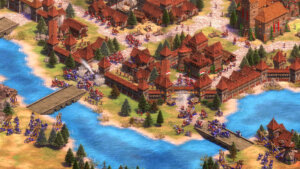
The real-time strategy (RTS) genre of games has its roots in the 1980s with a game called The Ancient Art of War. The player is required to partake in rock-paper-scissors-type gameplay between different types of warrior units.
In the genre today, we’ve moved past that simple concept and fleshed it out immensely: players are usually required to build bases, spawn units, and destroy the opponent.
A personal favorite of mine, the Age of Empires franchise, blends good old RTS with a strong edge of history. Specifically, Age of Empires II: Age of Kings throws the player into the RTS format of gameplay while playing through real-world scenarios like the Hundred Years’ War, the Spanish Reconquista, and the battles between William Wallace and the Kingdom of England.
If you’re a gamer who likes to micromanage things, build structures and units, and vanquish your foes with an army of longbowmen, real-time strategy games are right up your alley.
Role Playing Games
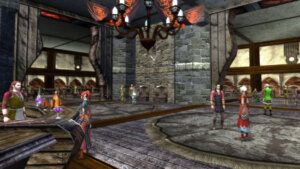
In my opinion, role-playing games are some of the most significant and fun games ever made. The roots of RPGs are as old as imagination itself. If you really want to narrow it down more, however, you could look to the famous Dungeons and Dragons, developed by Gary Gygax and Dave Arneson in 1974.
It’s a fantasy role-playing game in which players, along with a dungeon master (the one controlling the story and the players’ interactions), quest through dungeons using tabletop pieces, many-sided dice, and a bunch of creative brainpower.
There’s really nothing the player can’t do. You can create a character with a rich backstory: their wants, needs, phobias, etc. The sky is the limit.
Some of the standout titles that we all know and love, like The Elder Scrolls series, specifically Skyrim and the upcoming 6th entry into the series, have made RPG gaming more popular than ever. RPGs shine when there are no restrictions except the player’s imagination.
In the Elder Scrolls games, the player can choose between multiple races, each with their own pros and cons.
The game points you in the direction of the main quest, but you are ultimately left to your own creative devices, free to do nearly whatever you want.
On the other hand, you have great RPGs like The Witcher 3: Wild Hunt, where you take on the role of an established character thrown into the political intrigue of a fully fleshed-out world. The options are still there, but this time, an addictive and comprehensive storyline is included.
Games in the Assassin’s Creed franchise are now embracing more RPG elements in their series. Weapons, outfits, and video game characters can be customized, and there is a whole historical world to explore.
If you’re a gamer who loves a good storyline, freedom of choice when playing, or a game to ignite the imagination, role-playing games will fulfill that need.
Massively Multiplayer Online Role-Playing Games

Much like RPGs, MMORPGs (Massively Multiplayer Online Role-Playing Games) will ignite the imagination and throw the player into a detailed world. This time, however, it’s online. The world is now not only populated by some possibly detailed NPCs but also by other human players at the same time.
It originally started back in the 1970s with the release of Mazewar for computers. Players were able to roam mazes, shooting at each other on the predecessors of the internet. Game developer Richard Garriott (creator of the Ultima series of RPGs) then described these types of games like MMOs, which then led to MMORPGs.
Games like EverQuest, Anarchy Online, and Ultima Online were milestones in the genre. The gameplay styles are tailored to a gamer’s play style. Servers can be specified to be PvE (player vs. environment) or PvP (player vs. player), depending on whether you want to avoid more competitive playing scenarios.
In 2004, Blizzard, never satisfied with the nearly perfect games they create, dropped a bombshell on the world of gaming. They developed an RTS, Warcraft, into an MMORPG: World of Warcraft.
The player could choose between the two factions: Alliance or Horde. The player starts off doing menial quests like slaughtering boars for townspeople, eventually battling huge monsters like dragons with their friends later in-game.
Teaming up with other players adds a new dynamic to the playing style. Players can join the different classes to form a comprehensive team to take down some of the most powerful enemies in the game. World of Warcraft has been the gold standard in the genre for over 15 years now, with no signs of stopping.
Multiplayer Online Battle Arena

Online gameplay has become more popular than ever in the last decade. eSports, in particular, has increased tenfold from the early 2000s to become a legitimate sport and source of income for players.
You’ll often see a team of battle-tested gamers lined up in a row with powerful PCs, battling a likewise experienced opposing team for all the money, sponsorships, and bragging rights involved in the tournament. This is where MOBAs come in.
Multiplayer Online Battle Arena games are somewhat of an offshoot of MMOs, in that they are focused only on the competitive play between teams and players. MOBAs are an interesting combination of different genres, namely RTS and RPGs. Matches between teams can last anywhere from 30 minutes to an hour and beyond, depending on players’ skill levels and maps.
MOBAs really came onto the gaming scene with a mod for StarCraft: Aeon of Strife. In the game, players each had their own base they had to defend, fast gameplay to defeat the other team, and whittle down their resources to zero. It developed further into the widely popular derivative Defense of the Ancients (DotA) in 2003.
Ever since, players have been testing their mettle against each other in a variety of different titles, maps, and competitions.
Some of the most iconic eSports competitions and tournaments are courtesy of MOBAs. The game League of Legends is one of the most widely played games in the world, as well as a huge moneymaker for players looking to make a name for themselves on the eSports circuits.
In the 2018 League of Legends World Championship, the overall prize was an insane $6.45 million split between 24 different teams.
The gold and $2.4 million were awarded to the talented team, Invictus Gaming, led by Luo “Ferrari_430” Feichi out of China.
I hope this guide has given you a good idea of what each genre listed can provide for your unique playing style. Whether it be FPS games, RPGs, MMORPGs, RTS, or MOBAs, there is no shortage of choices for you to make.
These days, we are lucky to have the cornucopia of games that we do. Not only is the quality of titles great, but the variation in game genres is extensive. We have your basic genres along with their extensive subgenres. We are going to be taking a quick look at all of these and see some of the best titles defining the genres.
How many different types of video games are there?
Game Types: Breakdown
Stealth Games

Stealth games have the player act all sneakily, having them accomplish their mission through subterfuge and guile. Are you a good enough gamer to sneak from one side of the map to the other without being seen? Challenging and atmospheric, stealth games allow for experimentation and creativity. Games like Metal Gear Solid, the Thief series, and Splinter Cell are all stealth titles.
Fighting Games
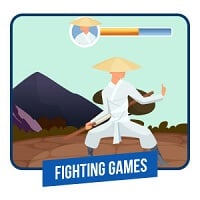 With the famous release of Street Fighter II in 1991, fighting games saw a huge uptick in popularity. These titles have you facing off against either a human or AI opponent, testing your knowledge of combos and your reflexes. Street Fighter II, Tekken, and Mortal Kombat are some iconic fighting games.
With the famous release of Street Fighter II in 1991, fighting games saw a huge uptick in popularity. These titles have you facing off against either a human or AI opponent, testing your knowledge of combos and your reflexes. Street Fighter II, Tekken, and Mortal Kombat are some iconic fighting games.
Survival Games
 In survival games, players are dropped into a hostile setting (think jungle, desert, the Arctic), usually with little to no tools, and tasked with basic survival. This trend has been growing for the past few years. With games like Rust, the survival genre is becoming increasingly legitimate. These are a mix of strategy, action, and role-playing. Rust, The Forest, and Day Z are survival titles.
In survival games, players are dropped into a hostile setting (think jungle, desert, the Arctic), usually with little to no tools, and tasked with basic survival. This trend has been growing for the past few years. With games like Rust, the survival genre is becoming increasingly legitimate. These are a mix of strategy, action, and role-playing. Rust, The Forest, and Day Z are survival titles.
Survival Horror Games
 These games are sure to chill your blood and give you a scare. The player is thrown into an actively antagonistic setting (usually) populated by eldritch horrors, forcing them to use their combat and intuition to survive. Games like Resident Evil pioneered the genre. Walking through the mansion, stalked by zombies and other horrors, gave the player the option of flight or fight when it came to the ghoulish horrors they came across. It even coined the phrase ‘enter the survival horror in the first game. Silent Hill, Resident Evil, and Alone in the Dark are all survival horror titles.
These games are sure to chill your blood and give you a scare. The player is thrown into an actively antagonistic setting (usually) populated by eldritch horrors, forcing them to use their combat and intuition to survive. Games like Resident Evil pioneered the genre. Walking through the mansion, stalked by zombies and other horrors, gave the player the option of flight or fight when it came to the ghoulish horrors they came across. It even coined the phrase ‘enter the survival horror in the first game. Silent Hill, Resident Evil, and Alone in the Dark are all survival horror titles.
Text Games
 This refers to entirely text-based games, where the player types in commands to move the story along. This was usually coupled with role-playing titles. The game would often prompt the player with an open-ended ‘What do you do?’ after describing the environment they are in. If the player wakes up in a cave, the player could type in ‘turn left’, ‘light torch’, and ‘walk forward’ to advance the game. This was a great mashup of fiction writing and role-playing.
This refers to entirely text-based games, where the player types in commands to move the story along. This was usually coupled with role-playing titles. The game would often prompt the player with an open-ended ‘What do you do?’ after describing the environment they are in. If the player wakes up in a cave, the player could type in ‘turn left’, ‘light torch’, and ‘walk forward’ to advance the game. This was a great mashup of fiction writing and role-playing.
Interactive Movie
 The game Dragon’s Lair was a famous pioneer in this genre. In it, there is a pre-recorded ‘movie’, with the player controlling some aspect of the action. In Dragon’s Lair, you need to press the appropriate button to make sure that you don’t fall into a spiked pit or avoid a fireball. This genre added extra immersion for the player. However, the value of replayability is hampered by a linear story.
The game Dragon’s Lair was a famous pioneer in this genre. In it, there is a pre-recorded ‘movie’, with the player controlling some aspect of the action. In Dragon’s Lair, you need to press the appropriate button to make sure that you don’t fall into a spiked pit or avoid a fireball. This genre added extra immersion for the player. However, the value of replayability is hampered by a linear story.
Role-Playing Games
 RPGs are games in which the player takes on a ‘role’ of a character in a (usually) fantastical setting, allowing the player to take on the role. These are made famous from tabletop gaming like Dungeons & Dragons, in which players would take their created character and journey through dungeons and towns, using skills to tailor their journey in unique ways.
RPGs are games in which the player takes on a ‘role’ of a character in a (usually) fantastical setting, allowing the player to take on the role. These are made famous from tabletop gaming like Dungeons & Dragons, in which players would take their created character and journey through dungeons and towns, using skills to tailor their journey in unique ways.
Massively Multiplayer Online Role-Playing Game
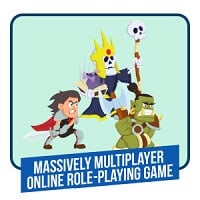 MMORPGs like World of Warcraft throw players into the setting of Warcraft, in which they can interact with thousands of other players simultaneously playing the same story and doing the same quests. Games like Ever Quest, Star Wars: The Old Republic, and Guild Wars are great examples.
MMORPGs like World of Warcraft throw players into the setting of Warcraft, in which they can interact with thousands of other players simultaneously playing the same story and doing the same quests. Games like Ever Quest, Star Wars: The Old Republic, and Guild Wars are great examples.
Tactical Role-Playing Games
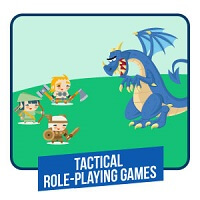 These RPGs heavily emphasize, you guessed it, tactics. They are usually set up like classic tabletop RPGs, in which players and enemies are set up on a grid and use their unique skills to make use of the environment through turn-based rolls and moves. Games like Banner Saga, Fallout, and Valkyria Chronicles are all examples of tactical RPGs.
These RPGs heavily emphasize, you guessed it, tactics. They are usually set up like classic tabletop RPGs, in which players and enemies are set up on a grid and use their unique skills to make use of the environment through turn-based rolls and moves. Games like Banner Saga, Fallout, and Valkyria Chronicles are all examples of tactical RPGs.
Sandbox RPGs
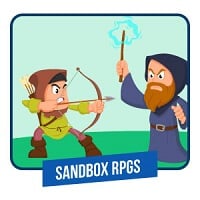 These RPGs emphasize freedom for the player. The player controls a character in a detailed world in which they have nearly complete control. In The Witcher III: Wild Hunt, the player controls the gruff Geralt of Rivia and can engage and complete quests at will. By that same token, Kingdom Come: Deliverance plops the player into early 1300s Bohemia, allowing the player to carry on as a young warrior. You can take part in the story, or you can simply ride around on a horse, hunt, and camp.
These RPGs emphasize freedom for the player. The player controls a character in a detailed world in which they have nearly complete control. In The Witcher III: Wild Hunt, the player controls the gruff Geralt of Rivia and can engage and complete quests at will. By that same token, Kingdom Come: Deliverance plops the player into early 1300s Bohemia, allowing the player to carry on as a young warrior. You can take part in the story, or you can simply ride around on a horse, hunt, and camp.
Strategy Games
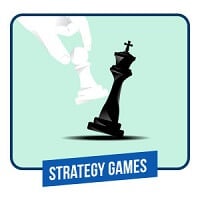 These games emphasize strategy to complete objectives. Whether playing virtual chess or building your civilization, brainpower is encouraged to get yourself to the end of the game.
These games emphasize strategy to complete objectives. Whether playing virtual chess or building your civilization, brainpower is encouraged to get yourself to the end of the game.
This is another genre with multiple subgenres.
4X
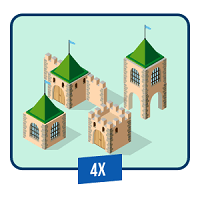 These games are called ‘4X’ for the tenets of the subgenre: “eXplore, eXpand, eXploit, and eXterminate”. Games like Civilization are the staples of the subgenre, in which you start humbly as a few units, eventually build your cities and arsenals, and destroy enemy players through combat, diplomacy, or technological advancement.
These games are called ‘4X’ for the tenets of the subgenre: “eXplore, eXpand, eXploit, and eXterminate”. Games like Civilization are the staples of the subgenre, in which you start humbly as a few units, eventually build your cities and arsenals, and destroy enemy players through combat, diplomacy, or technological advancement.
Grand Strategy
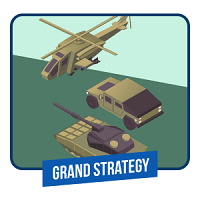 These games are all about the big picture. Many grand strategy games are based on history: games like Europa Universalis and the Total War franchise are grand strategies.
These games are all about the big picture. Many grand strategy games are based on history: games like Europa Universalis and the Total War franchise are grand strategies.
In them, you need to steer a nation or faction to victory, managing the economy, research of technology, and, of course, military might.
Real-time Strategy
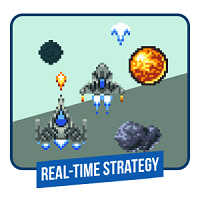 RTS games are based on gathering resources and crushing your opponent, all in real-time. Games like Age of Empires and StarCraft are the standard. Collecting enough resources to build up your weapons and units to obliterate your opponent is the name of the game.
RTS games are based on gathering resources and crushing your opponent, all in real-time. Games like Age of Empires and StarCraft are the standard. Collecting enough resources to build up your weapons and units to obliterate your opponent is the name of the game.
Mobile Online Battle Area
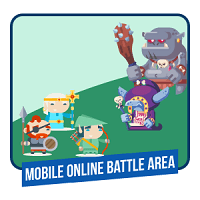 Out of the mod ‘DotA’, MOBAs have become extremely popular. You are set up on a map with four corners, in which you need to either score more points than your opponent or destroy them. Popular examples of MOBA games are League of Legends, Smite, Heroes of the Storm, Defense of the Ancients, Arena of Valor, Heroes of Newerth, and Vainglory, among others.
Out of the mod ‘DotA’, MOBAs have become extremely popular. You are set up on a map with four corners, in which you need to either score more points than your opponent or destroy them. Popular examples of MOBA games are League of Legends, Smite, Heroes of the Storm, Defense of the Ancients, Arena of Valor, Heroes of Newerth, and Vainglory, among others.
Tower Defense
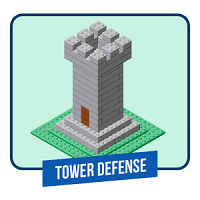 These games are nail-biters. You need to, unsurprisingly, defend your base. The AI will throw thousands of enemy units at you, and you are tasked with adapting and overcoming their onslaught. It requires you to change your playstyle on the fly, as well as make snap decisions to minimize damage to your base and maximize efficiency.
These games are nail-biters. You need to, unsurprisingly, defend your base. The AI will throw thousands of enemy units at you, and you are tasked with adapting and overcoming their onslaught. It requires you to change your playstyle on the fly, as well as make snap decisions to minimize damage to your base and maximize efficiency.
Simulation Games
 These titles are all about immersing the player in the action of simulating an activity. They range from flight sims and city-building games. A sense of realism is emphasized, giving the player the sensation of actually performing.
These titles are all about immersing the player in the action of simulating an activity. They range from flight sims and city-building games. A sense of realism is emphasized, giving the player the sensation of actually performing.
Vehicle Simulators
 These games have been around for decades. In them, the player is usually the pilot of a plane or some other vehicle, such as a train. The player pilots the vehicle as best they can, using realistic controls and schematics to land, take off, pull in and out of the station, and more.
These games have been around for decades. In them, the player is usually the pilot of a plane or some other vehicle, such as a train. The player pilots the vehicle as best they can, using realistic controls and schematics to land, take off, pull in and out of the station, and more.
City-Building
 City-building has the player construct cities from the ground up. Cities: Skylines and SimCity are great examples of this genre. Not only does the player build buildings, but they also partake in connecting power lines, water mains, highways, and byways.
City-building has the player construct cities from the ground up. Cities: Skylines and SimCity are great examples of this genre. Not only does the player build buildings, but they also partake in connecting power lines, water mains, highways, and byways.
Life Sim
 These games allow players to simulate life. Namely, The Sims has the player building both a family unit and a house for them to live in. They are then tasked with controlling everything from job attendance to bathroom breaks. You are there every step of the way, along with the characters’ lives.
These games allow players to simulate life. Namely, The Sims has the player building both a family unit and a house for them to live in. They are then tasked with controlling everything from job attendance to bathroom breaks. You are there every step of the way, along with the characters’ lives.
Party Games
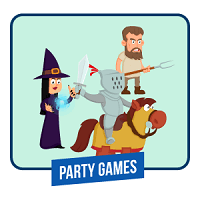 Party games involve the participation of multiple people, best played at parties and gatherings of 2 or more people. They are multiplayer and usually pit the players against one another. A famous (or infamous, depending on your experience) example of a party game is Mario Party.
Party games involve the participation of multiple people, best played at parties and gatherings of 2 or more people. They are multiplayer and usually pit the players against one another. A famous (or infamous, depending on your experience) example of a party game is Mario Party.
Trivia
 These games involve players in answering general or specific trivia questions to score points and win. Trivial Pursuit, HQ, and Trivia Crack are all great trivia games that are extremely popular. Some examples are QuizUp, Jeopardy! World Tour, Trivia 360, Family Feud, and SongPop.
These games involve players in answering general or specific trivia questions to score points and win. Trivial Pursuit, HQ, and Trivia Crack are all great trivia games that are extremely popular. Some examples are QuizUp, Jeopardy! World Tour, Trivia 360, Family Feud, and SongPop.
Puzzle Games
 Puzzles are great ways to engage in your logic and problem-solving skills. Notable examples include, Portal, Tetris, Braid, Bejeweled, Myst, and Candy Crush Saga.
Puzzles are great ways to engage in your logic and problem-solving skills. Notable examples include, Portal, Tetris, Braid, Bejeweled, Myst, and Candy Crush Saga.
Board Games
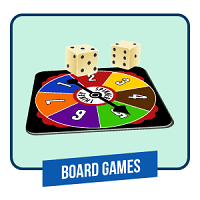 Good, old-fashioned board games have been around forever and occupy players of all ages with engaging, fun gameplay. They are usually party games, bringing multiple people together to either go against one another or work together toward a common goal. Examples are Cards Against Humanity, Risk, and Monopoly.
Good, old-fashioned board games have been around forever and occupy players of all ages with engaging, fun gameplay. They are usually party games, bringing multiple people together to either go against one another or work together toward a common goal. Examples are Cards Against Humanity, Risk, and Monopoly.
Sports Games
 These games are based on multiple sports. They have a few subgenres, emphasizing a specific sport or activity. Some can even be considered simulation games due to their realism and activities. A few examples are namely, Madden NFL, NBA Jam, Wii Sports, FIFA 20, and Tony Hawk’s.
These games are based on multiple sports. They have a few subgenres, emphasizing a specific sport or activity. Some can even be considered simulation games due to their realism and activities. A few examples are namely, Madden NFL, NBA Jam, Wii Sports, FIFA 20, and Tony Hawk’s.
Team Sports
 These are the bread and butter of sports games. Baseball, basketball, football; all of it is here. Over the years, sports games have gone through innovation and growth, including real players, real teams, and even real venues pulled from everyday life to add to the realism. Different aspects like pitching mechanics, physics when performing a jump shot, and making that perfect pass all exemplify team sports games.
These are the bread and butter of sports games. Baseball, basketball, football; all of it is here. Over the years, sports games have gone through innovation and growth, including real players, real teams, and even real venues pulled from everyday life to add to the realism. Different aspects like pitching mechanics, physics when performing a jump shot, and making that perfect pass all exemplify team sports games.
Combat Sports
 Fight Night and UFC are the staples of combat sports. These two sports border on the simulation, as the realism and strategic play drive the successes and failures of the participants. Real fighters populate rosters, and players can set up their dream matchups, such as Muhammad Ali versus Mike Tyson. Popular titles include Fight Night Round 4, EA Sports MMA, UFC 2009 Undisputed, and Fight Night Champion.
Fight Night and UFC are the staples of combat sports. These two sports border on the simulation, as the realism and strategic play drive the successes and failures of the participants. Real fighters populate rosters, and players can set up their dream matchups, such as Muhammad Ali versus Mike Tyson. Popular titles include Fight Night Round 4, EA Sports MMA, UFC 2009 Undisputed, and Fight Night Champion.
Racing
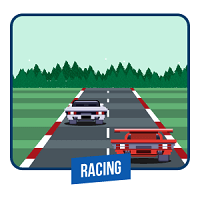 What is better than flooring it in an expensive car? Racing games allow players to be behind the wheel of cars, whether they be real, tricked out, or just plain normal. These head-to-head games have grown from arcade classics into great simulations. Gran Turismo has the player buy their cars, making it more than a racing game. Notable games are Colin McRae Rally, Forza Horizon 4, Gran Turismo Sport, The Crew, and Assetto Corsa.
What is better than flooring it in an expensive car? Racing games allow players to be behind the wheel of cars, whether they be real, tricked out, or just plain normal. These head-to-head games have grown from arcade classics into great simulations. Gran Turismo has the player buy their cars, making it more than a racing game. Notable games are Colin McRae Rally, Forza Horizon 4, Gran Turismo Sport, The Crew, and Assetto Corsa.
First Person Shooters
 The cream of the crop, and some of the most popular games in recent memory, FPS titles have sold millions upon millions of copies and engage players of all ages in the fast-paced action. Call of Duty is the prime example, having addictive multiplayer gameplay, as well as exhilarating single-player stories. A few title are Counter-Strike: Global Offensive, Wolfenstein 3D, Left 4 Dead 2, Doom, Paladins, and Overwatch.
The cream of the crop, and some of the most popular games in recent memory, FPS titles have sold millions upon millions of copies and engage players of all ages in the fast-paced action. Call of Duty is the prime example, having addictive multiplayer gameplay, as well as exhilarating single-player stories. A few title are Counter-Strike: Global Offensive, Wolfenstein 3D, Left 4 Dead 2, Doom, Paladins, and Overwatch.
Tactical FPS
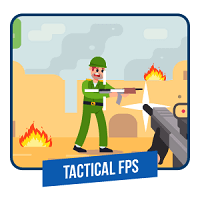 Maybe fast-paced is not your style in FPS games. Maybe you want to take it slow, be more methodical in the approach to your objectives. In Rainbow Six, a tactical shooter in which you take control of a special unit resembling a SWAT team, you need to plan out every little detail to make sure your mission is a success. Any mistake could end up with you and your team members checking out early.
Maybe fast-paced is not your style in FPS games. Maybe you want to take it slow, be more methodical in the approach to your objectives. In Rainbow Six, a tactical shooter in which you take control of a special unit resembling a SWAT team, you need to plan out every little detail to make sure your mission is a success. Any mistake could end up with you and your team members checking out early.
Rhythm Games
 These games, usually based around music, make the player keep in time with a beat. Guitar Hero allowed players to play along with some iconic guitar-based tracks. Dance Dance Revolution and Just Dance did the same with different genres of music. It is all about keeping in time and hitting all of your marks. Notable examples include Rock Band, Cytus, osu!, Deemo, and Beatmania.
These games, usually based around music, make the player keep in time with a beat. Guitar Hero allowed players to play along with some iconic guitar-based tracks. Dance Dance Revolution and Just Dance did the same with different genres of music. It is all about keeping in time and hitting all of your marks. Notable examples include Rock Band, Cytus, osu!, Deemo, and Beatmania.
Platformer
 These games, like Mario, have the player take control of a character, usually in the third person. They usually have to jump and navigate around a level akin to an obstacle course. Prime examples are Tomba, Mario, and The Prince of Persia.
These games, like Mario, have the player take control of a character, usually in the third person. They usually have to jump and navigate around a level akin to an obstacle course. Prime examples are Tomba, Mario, and The Prince of Persia.
Educational Games
 These games emphasize learning something. They are usually geared towards younger players. The Oregon Trail was a unique educational game, as it had different elements of game genres blended into an educational package that didn’t feel like an educational game. These games can teach kids to read, do math, study better, and get them interested in different subjects in school. Examples include Overland, The Flame in the Flood, 80 Days, and The Banner Saga.
These games emphasize learning something. They are usually geared towards younger players. The Oregon Trail was a unique educational game, as it had different elements of game genres blended into an educational package that didn’t feel like an educational game. These games can teach kids to read, do math, study better, and get them interested in different subjects in school. Examples include Overland, The Flame in the Flood, 80 Days, and The Banner Saga.
Exercise Games
 Wii Fit was an interesting advancement in gaming, as it introduced a comprehensive fitness tracker for players when they exercised using a specialized mat. Other apps and games have followed Wii Fit’s example, tracking exercise patterns and trends. It helps players lose weight, stay active, and live a better life. It created benefits of video games we hadn’t yet seen before.
Wii Fit was an interesting advancement in gaming, as it introduced a comprehensive fitness tracker for players when they exercised using a specialized mat. Other apps and games have followed Wii Fit’s example, tracking exercise patterns and trends. It helps players lose weight, stay active, and live a better life. It created benefits of video games we hadn’t yet seen before.
Which Genre Is Right for You?
Q: I love fast-paced action and competition. What should I play?
A: First-Person Shooters (FPS) and MOBAs are perfect for adrenaline junkies who enjoy quick reflexes, tactical gameplay, and competitive multiplayer.
Q: I enjoy deep stories and player freedom. Any recommendations?
A: RPGs and MMORPGs give you rich narratives, immersive worlds, and the freedom to shape a character’s journey.
Q: I like strategy and careful planning. Which games suit me?
A: Dive into Real-Time Strategy (RTS) or 4X games, where resource management, tactical decision-making, and long-term planning are key.
Q: I want to stimulate my brain through challenges. What should I try?
A: To engage your logic, pattern recognition, and problem-solving skills, try Puzzle games and Trivia games.
Q: I prefer creative or relaxing gameplay. Any suggestions?
A: Simulation games and Sandbox games that let you build, explore, and experiment can be ideal.
Q: I’m looking for social and group fun. What fits?
A: Party games and Sports games are perfect for multiplayer fun, whether at gatherings or online sessions.
Q: I want a real challenge and skill-testing gameplay. What should I pick?
A: Survival games, Platformers, and Fighting games will keep you on your toes with their skill-based mechanics and tricky obstacles.
Final Thoughts
Video game genres are now more widespread than ever. From action games to Sandbox and Open World Games to Simulation Games to Strategy Games, every player will surely find a perfect match for their playstyle and interest. Nonetheless, one cannot go wrong, as each genre offers unique experiences, challenges, and communities. What are you waiting for? Game on!
